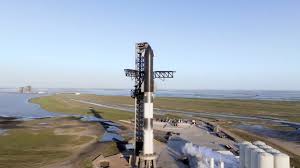
According to NASA, Starship‘s third flight test will feature a major demonstration needed for the overall success of landing humans on the Moon with the Artemis program. In a meeting, slides showed Starship Flight 3 being the first mission to demonstrate in-orbit propellent transfer. However, the schedule is still up in the air.
Starship Flight 3 could be big for Artemis
In a meeting on Monday, the National Academies of Sciences, Engineering, and Medicine, which is conducting a study of NASA’s critical workforce, infrastructure, and technology, met with several NASA officials to go over the agency’s Moon to Mars program, including Artemis.
Lakiesha Hawkins, NASA’s Deputy Assistant Associate Administrator for the agency’s Moon to Mars program, gave an update across all of the in-space hardware it is developing. This ranged from the xEVA suits by Axiom and Collins, to Gateway, Orion, and the Human Landing System.
The update shared brief updates for where each HLS providers are in their development of their respective landers. For Blue Origin, who just recent received their contract, the company has already delivered its mock up to the agency. For SpaceX it looks like the company will complete the first tank-to-tank transfer of cryogenic propellent in orbit on Flight 3.
While Russia regularly refuels the ISS with hypergolic propellents, these can be stored at pretty much any temperatures for months or years on end. Cryogenic propellents, which are much more efficient, usually can’t last for more than a few hours in space before they boil off.
For both of NASA’s HLS landers, they will need to develop technologies to extend the lifespan of their propellents, SpaceX with methane and oxygen and Blue Origin with hydrogen and oxygen, as well as transferring it between spacecraft in orbit.
While Starship Flight 3 won’t feature any vehicle-to-vehicle refueling, it will begin the journey to that with a tank-to-tank transfer of liquid oxygen. How we expect this to happen is once in its coast phase, SpaceX will move 10 metric tons of propellent from the Starship upper stage’s main tank to its header tank located at the nose of the vehicle.
While small compared to the 15 or so tanker spacecraft needed to refuel an entire Starship HLS lander, this test is a big step forward in developing a required technology for NASA’s Artemis 3 landing. Without it, there is no chance of completing any landings in the agency’s timelines.
The timeline however is still fluid
Just like the propellents that have to be stored at hundreds of degrees below zero, Starship’s third flight schedule is very fluid.
Elon Musk has said that it wants hardware ready to fly sometime this month, however we haven’t seen any stages begin testing at the launch site just yet. Work though is moving forward on a lot of the final V1 Starship upper stages in Starbase’s high bay. The company is also working through refurbishment work at the launch site after November’s flight.
SpaceX will have to wait once again for the FAA to close out its mishap investigation into Starship’s second flight before moving forward with a third. A NASA spokesperson has shared with the media that the tank-to-tank test is only a possibility, and could be pushed to a later flight.
Right now, SpaceX’s primary mission is to get Starship through its flight profile, which ends with a splash down off the coast of Hawaii. Flight 2 saw major improvements and met the company’s milestones of a clean stage separation and improved reliability of the Raptor engines in flight. But both stages still exploded shortly after showing those improvements.
While there is plenty of forward movement on Starship’s development, NASA has the goal to land astronauts on the Moon’s surface with Artemis 3 in 2026. A date that is unlikely to be met due to several programs being behind schedule, including Starship.


 Optimisus
Optimisus DogeHome
DogeHome Optimisus
Optimisus Optimisus
Optimisus BlockchainReporter
BlockchainReporter BlockchainReporter
BlockchainReporter Optimisus
Optimisus Optimisus
Optimisus






















